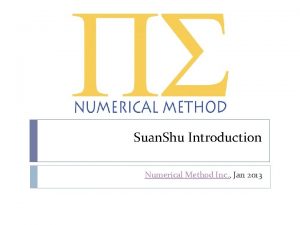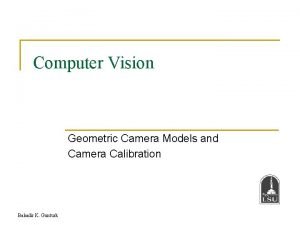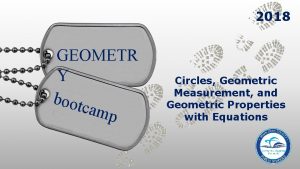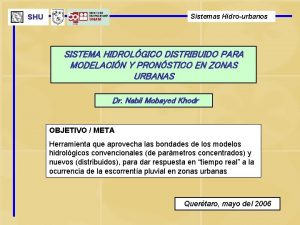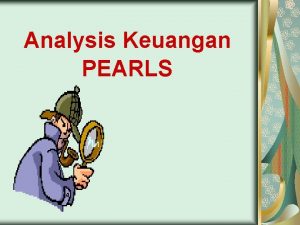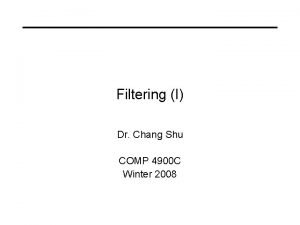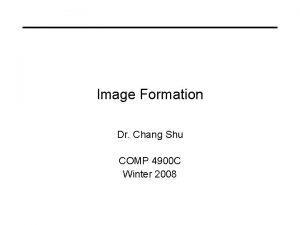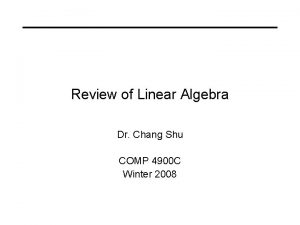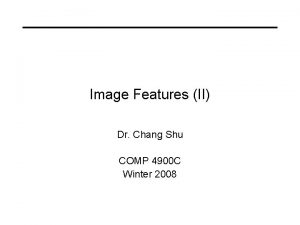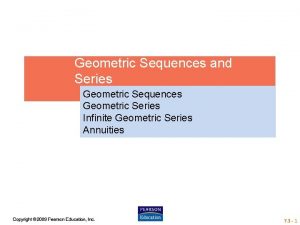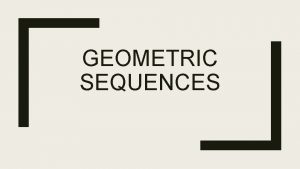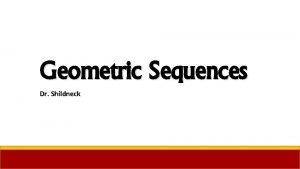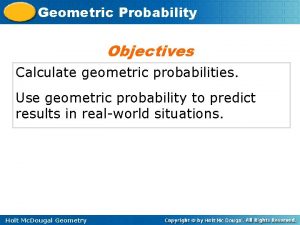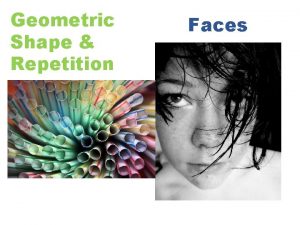Geometric Model of Camera Dr Chang Shu COMP












![Extrinsic Parameters [R|T] defines the extrinsic parameters. The 3 x 4 matrix M = Extrinsic Parameters [R|T] defines the extrinsic parameters. The 3 x 4 matrix M =](https://slidetodoc.com/presentation_image_h2/522fe01b675a582518154cf037c44250/image-13.jpg)


- Slides: 15

Geometric Model of Camera Dr. Chang Shu COMP 4900 C Winter 2008

Geometric Model of Camera Perspective projection P p y optical center x principal point image plane principal axis P(X, Y, Z) p(x, y)

Four Coordinate Frames xim Yc camera frame optical center Camera model: pixel frame yim y Xc Zc image plane frame Pw Yw Zw world frame x principal point Xw

Coordinate Transformation – 2 D P Rotation and Translation T

Homogeneous Coordinates Go one dimensional higher: is an arbitrary non-zero scalar, usually we choose 1. From homogeneous coordinates to Cartesian coordinates:

2 D Transformation with Homogeneous Coordinates 2 D coordinate transformation: 2 D coordinate transformation using homogeneous coordinates:

3 D Rotation Matrix Rotate around each coordinate axis: Combine three rotations: 3 D rotation matrix has three parameters.

Perspective Projection P p y optical center x principal point principal axis These are nonlinear. image plane Using homogenous coordinate, we have a linear relation:

World to Camera Coordinate Transformation between the camera and world coordinates: R, T

Image Coordinates to Pixel Coordinates pixel sizes xim y x (ox, oy)

Put All Together – World to Pixel

Camera Intrinsic Parameters K is a 3 x 3 upper triangular matrix, called the Camera Calibration Matrix. There are five intrinsic parameters: (a) The pixel sizes in x and y directions (b) The focal length (c) The principal point (ox, oy), which is the point where the optic axis intersects the image plane.
![Extrinsic Parameters RT defines the extrinsic parameters The 3 x 4 matrix M Extrinsic Parameters [R|T] defines the extrinsic parameters. The 3 x 4 matrix M =](https://slidetodoc.com/presentation_image_h2/522fe01b675a582518154cf037c44250/image-13.jpg)
Extrinsic Parameters [R|T] defines the extrinsic parameters. The 3 x 4 matrix M = K[R|T] is called the projection matrix.

Weak Perspective Model If the relative distance between any two points along the principal axis is much smaller than the average distance The camera projection can be approximated as: This is the weak-perspective camera model.

Radial Distortions are the coordinates of the distorted points, and
 Suan shu shu
Suan shu shu Single camera setup
Single camera setup Single camera vs multi camera
Single camera vs multi camera Geometric camera models
Geometric camera models 2018 geometry bootcamp answers
2018 geometry bootcamp answers Maytas login shu
Maytas login shu 5400 shu
5400 shu Informasi dasar shu
Informasi dasar shu Neraca saldo koperasi simpan pinjam
Neraca saldo koperasi simpan pinjam Also all by shu ting
Also all by shu ting Materi shu ekonomi kelas 10
Materi shu ekonomi kelas 10 Pengertian shu
Pengertian shu Rumus analisis pearls
Rumus analisis pearls Noel shu
Noel shu Pao lim
Pao lim Shu god of air
Shu god of air
